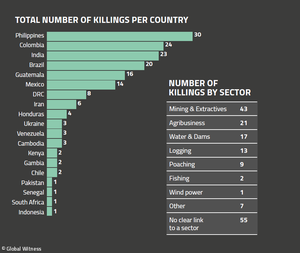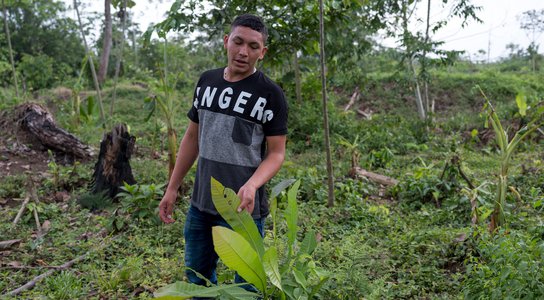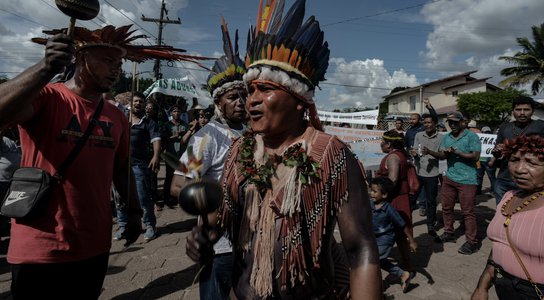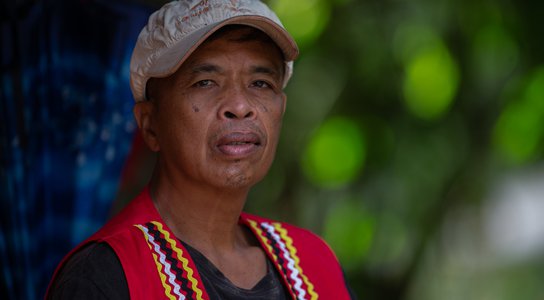Please note - our 2018 data has been updated since publication. In Colombia we noted 24 cases in the original report - this has been updated to 25. In Indonesia, we covered 1 case in the report, this has been updated to 3. The total number for 2018 is there for 167 instead of 164.
More than three
people were murdered each week in 2018, with countless more criminalised, for
defending their land and our environment.

Calls to protect the planet are growing louder – but around the world, those defending their land and our environment are being silenced. More than three such people were murdered on average every week in 2018, with attacks driven by destructive industries like mining, logging and agribusiness.
These are ordinary
people trying to protect their homes and livelihoods, and standing up for the
health of our planet. Often their land is violently grabbed to produce goods
used and consumed across the world every day, from food, to mobile phones, to
jewellery.
Download the full report: Enemies of the State? (PDF, 3.8MB)
They say we are terrorists, delinquents, assassins and that we have armed groups here, but really they’re just killing us. - Joel Raymundo, member of the Peaceful Resistance of Ixquisis movement
Our Findings
Julián Carrillo knew he was in danger long before his body was found riddled with bullets in October 2018. He was the sixth member of his family to die in two years after opposing mining on their community’s land in Mexico.
Days earlier, gunmen had massacred nine men, women and children over a long-running land dispute on the island of Negros, in central Philippines.
And in Iran, renowned academic Kavous Seyed-Emami died in prison in suspicious circumstances, one of nine environmentalists jailed over accusations that they were using their work protecting cheetahs as a cover for spying.
Because many other deaths go unrecorded, the figures in this report are almost certainly a sizeable underestimate. Nonetheless, the stories it tells show how a growing demand for land to meet consumer demand is driving deadly violence around the world.
- In 2018 Guatemala recorded the sharpest rise in murders, which jumped more than fivefold to make it the deadliest country per capita.
- The Philippines had the highest number of killings of any country this year, with at least 30 defenders murdered.
- Mining was the worst sector, causing 43 deaths, though deaths related to conflicts over water sources also surged. Attacks driven by agribusiness, logging and hydropower continued too.
- Private security groups, state forces and contract killers – sometimes working together – are all suspected of carrying out killings.
Criminalisation of Defenders
Stand with Environmental Defenders.
But deadly violence is only the most visible of the myriad threats that defenders face.
Across continents, governments and companies are also using countries’ courts and legal systems as instruments of oppression against those who threaten their power and interests.
That’s why this year, for the first time, we have documented the many ways that defenders are being criminalised, including:
- In some countries, the state is labelling defenders as terrorists or enemies of the state, as in the case of nine environmentalists who were jailed in Iran, accused of spying.
- As we have seen with the crackdown on anti-fracking activism in the UK, governments and industry are also flexing national laws to outlaw protest.
Criminalising defenders in this way makes attacks on them seem legitimate, making them more likely. These trends continue across the globe, helped by populist politicians who are stripping away vital environmental protections when we need them most.
How to Stop the Silencing
The failure of
many governments and companies to act responsibly, ethically or even legally is
a major driving force behind crimes committed against land
and environment defenders.
Businesses have a duty to ensure their customers are not unwittingly supporting projects that drive people out of their homes or devastate ecosystems. Consumers have a right to demand that these companies live up to their responsibilities.
Moreover, as our investigations have shown, the projects driving these environmental and human rights abuses are often funded by ordinary people’s savings or investments, more often than not without their knowledge. From energy to agriculture, so-called development projects in much of the world are driving rampant deforestation, mass displacement and climate chaos.
Governments, investors and business all have the power to protect the environment and those that defend it. Ordinary people – as consumers, pension holders and voters – can help make these changes happen.
As we hurtle towards climate breakdown, it is more important than ever that we break the cycle of silence that allows the powerful to trample over human rights and the natural world. We must ensure that the voices of land and environment defenders are heard.
We all live on
the same planet. We are all connected by our shared humanity. We all share a
common future that will be defined by what we do to protect our environment. If
you agree with this idea, then stand with defenders and support their voices.
Find out what you can do here.


